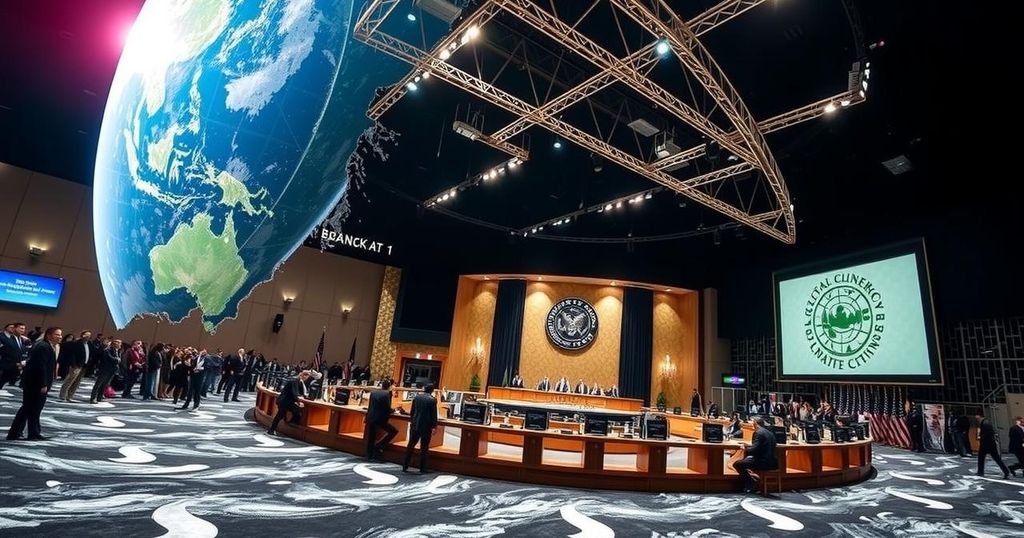Overview of COP29: Climate Talks Amidst Political and Environmental Challenges

COP29, the 29th annual climate change conference, will occur from November 11-22 in Baku, Azerbaijan. Focusing on securing financial commitments to assist developing nations in climate mitigation and adaptation, the meeting is overshadowed by geopolitical tensions and absent key leaders. Azerbaijan’s human rights issues and fossil fuel ambitions raise further concerns about the host’s suitability. The outcomes of COP29 are anticipated to significantly influence global climate policies and financial mechanisms for addressing climate change.
The 29th annual Conference of the Parties (COP29), convened by the United Nations, aims to address the pressing issue of climate change from November 11 to November 22 in Baku, Azerbaijan. World leaders will gather with a focus on financing strategies for developing nations to mitigate greenhouse gases and adapt to climate impacts. However, the ongoing geopolitical unrest, economic challenges, and notable absences among key leaders such as U.S. President Joe Biden and Chinese leader Xi Jinping cast uncertainty over the effectiveness of discussions aimed at international climate goals. Azerbaijan’s controversial human rights record and aspirations to expand fossil fuel production raise further questions about the conference’s alignment with global climate transition efforts. COP refers to the ‘Conference of the Parties’ associated with the UN Framework Convention on Climate Change (UNFCCC), a treaty ratified by nearly 200 countries in 1992. This decision-making body is essential in shaping global responses to climate change, with annual summits to gather nations for crucial negotiations. At the heart of COP29 will be discussions about financial commitments, with developing countries demanding significant financial support to combat climate change. The goal is to achieve over one trillion dollars a year by 2030, a daunting challenge presented by rich and developing nation dynamics. The choice of Azerbaijan as the host has sparked debate given its planned gas expansion and lack of a supporting climate-friendly blueprint. Critics also emphasize concerns over Azerbaijan’s poor human rights track record, which complicates its role in leading global climate dialogues. Notably, the recent election of Donald Trump, a recognized climate skeptic, heightens apprehension regarding U.S. participation, presenting formidable obstacles for international agreements. Analysts believe that even if President Biden’s administration pursues progressive goals, Trump’s looming influence could undermine long-term commitments within the Paris Agreement. The ongoing climate crisis is underscored by recent alarming climate projections indicating 2024 could be the warmest year recorded, exacerbating the urgency of COP29 discussions. Extreme weather events, such as devastating floods in Spain and unprecedented hurricanes in the U.S., reiterate the immediate consequences of climate change. The outcomes of COP29 are anticipated to influence economic structures and climate finance, shaping long-term strategies for global warming mitigation and establishing more resilient infrastructures against climate-related disasters.
The Conference of the Parties (COP), organized by the United Nations, serves as a vital forum where countries negotiate critical actions to address climate change. This meeting continues an annual series, affirming global commitments made under the UNFCCC initiated in 1992. COP29, set in Baku, Azerbaijan, is pivotal in confronting the dual challenges of increasing carbon emissions and climate adaptation, particularly for developing nations affected most by climate-related disasters. As nations grapple with geopolitical instability and economic downturns, the presence and participation of world leaders assume critical importance in advancing collective climate objectives. Furthermore, Azerbaijan’s intent to expand its gas industry raises significant concerns regarding the conference’s overall effectiveness in addressing planetary climate crises while navigating its controversial human rights landscape and political climate.
COP29 represents a crucial moment for international climate negotiations amid a backdrop of significant political and economic challenges. The conference focuses on financial support for developing nations, essential for tackling greenhouse gas emissions and enhancing climate resilience. However, notable absences among key leaders and contentious hosting conditions in Azerbaijan raise doubts about the potential for substantive agreements. The expected outcomes of this meeting could shape global climate actions and reflect on the readiness of nations to confront the escalating climate crisis while balancing their economic interests.
Original Source: www.bbc.com








